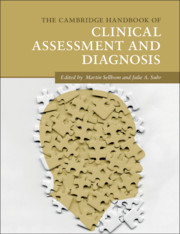Book contents
- The Cambridge Handbook of Clinical Assessment and Diagnosis
- The Cambridge Handbook of Clinical Assessment and Diagnosis
- Copyright page
- Contents
- Figures
- Tables
- Contributors
- Acknowledgments
- 1 Introduction to the Handbook of Clinical Assessment and Diagnosis
- Part I General Issues in Clinical Assessment and Diagnosis
- 2 Psychometrics and Psychological Assessment
- 3 Multicultural Issues in Clinical Psychological Assessment
- 4 Ethical and Professional Issues in Assessment
- 5 Contemporary Psychopathology Diagnosis
- 6 Assessment of Noncredible Reporting and Responding
- 7 Technological Advances in Clinical Assessment
- 8 Psychological Assessment as Treatment
- 9 Writing a Psychological Report Using Evidence-Based Psychological Assessment Methods
- Part II Specific Clinical Assessment Methods
- Part III Assessment and Diagnosis of Specific Mental Disorders
- Part IV Clinical Assessment in Specific Settings
- Index
- References
6 - Assessment of Noncredible Reporting and Responding
from Part I - General Issues in Clinical Assessment and Diagnosis
Published online by Cambridge University Press: 06 December 2019
- The Cambridge Handbook of Clinical Assessment and Diagnosis
- The Cambridge Handbook of Clinical Assessment and Diagnosis
- Copyright page
- Contents
- Figures
- Tables
- Contributors
- Acknowledgments
- 1 Introduction to the Handbook of Clinical Assessment and Diagnosis
- Part I General Issues in Clinical Assessment and Diagnosis
- 2 Psychometrics and Psychological Assessment
- 3 Multicultural Issues in Clinical Psychological Assessment
- 4 Ethical and Professional Issues in Assessment
- 5 Contemporary Psychopathology Diagnosis
- 6 Assessment of Noncredible Reporting and Responding
- 7 Technological Advances in Clinical Assessment
- 8 Psychological Assessment as Treatment
- 9 Writing a Psychological Report Using Evidence-Based Psychological Assessment Methods
- Part II Specific Clinical Assessment Methods
- Part III Assessment and Diagnosis of Specific Mental Disorders
- Part IV Clinical Assessment in Specific Settings
- Index
- References
Summary
Invalid responding is an important consideration in mental health assessment. Given that most assessment data are gathered from self-report methods, accurate diagnostic and clinical impressions can be compromised by various forms of response bias. In this chapter, we review the ways in which evaluations of psychopathology, neurocognitive symptoms, and medical/somatic presentations can be compromised due to noncredible responding and invalidating test-taking approaches. We cover a variety of strategies and measures that have been developed to assess invalid responding. Further, we discuss evaluation contexts in which invalid responding is most likely to occur. We conclude with some remarks regarding cultural considerations as well as how technology can be incorporated into the assessment of response bias.
- Type
- Chapter
- Information
- Publisher: Cambridge University PressPrint publication year: 2019

